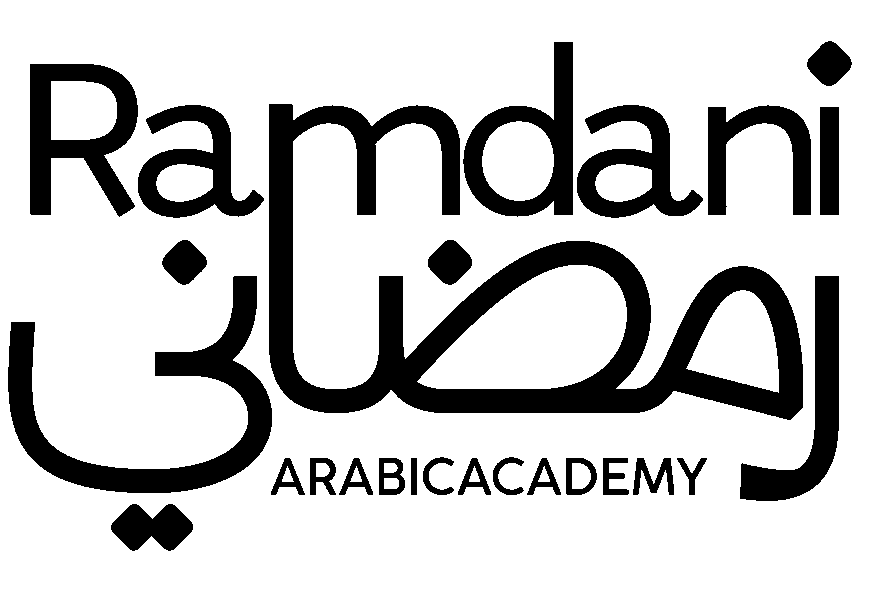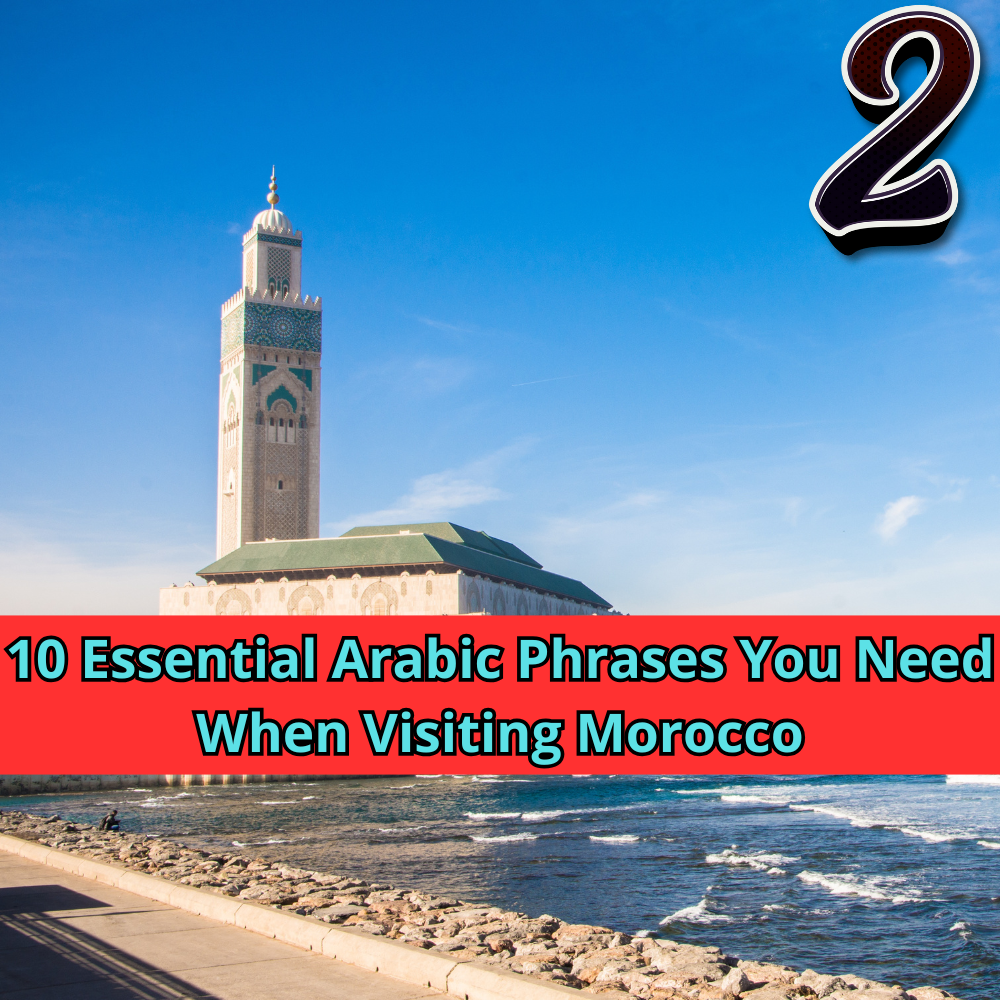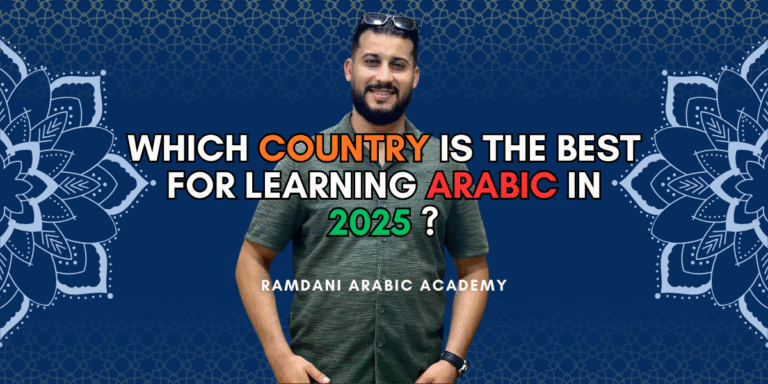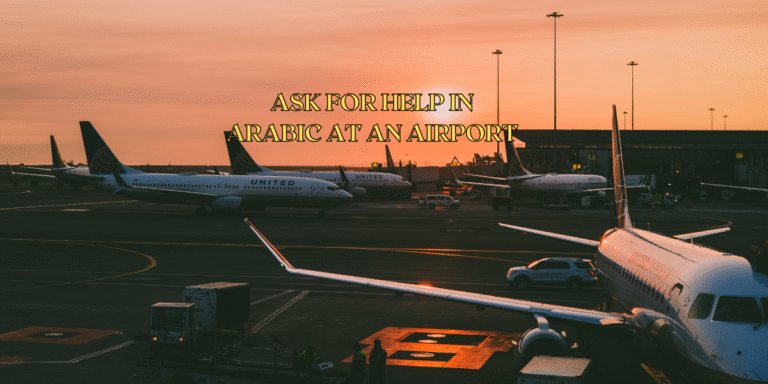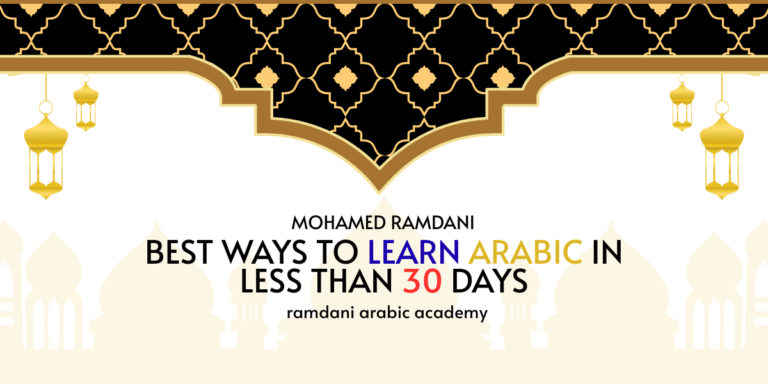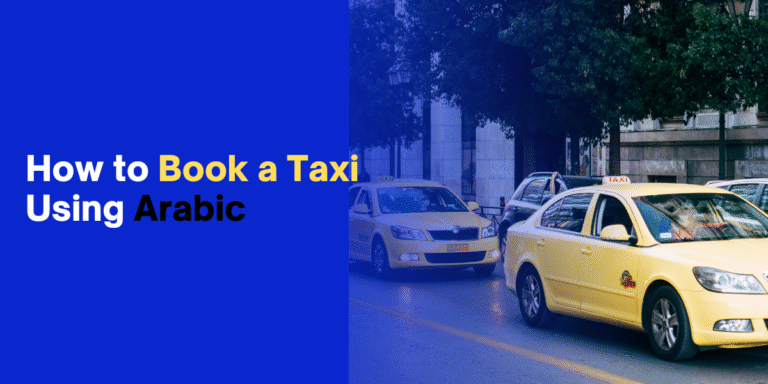10 Essential Arabic Phrases You Need When Visiting Morocco Part 2
I’m Mohamed Ramdani. I’m from Morocco. I’ve been teaching Arabic online for more than seven years. I work mostly with non-native speakers—people from different backgrounds, religions, and goals. Many of my students are children of immigrants or travelers who want to understand the language before visiting Morocco.
I hold a degree in Islamic Studies and several diplomas in teaching methods. I focus on reading and writing, but what I see again and again is that most learners just want one thing: to speak Arabic in real situations without feeling lost or embarrassed.
That’s why I started writing this kind of content. Because most phrasebooks and apps don’t help you when you’re standing in a crowded market in Fes, trying to ask for the price of something. Or when you’re in a taxi in Casablanca and want to explain where you’re going. Or when someone speaks to you in fast Darija and you just freeze.
This series gives you the basics—the Arabic phrases that really matter when you’re in Morocco. Not the formal, unused stuff. Not the long grammar lessons. Just the words and sentences you’ll need every day. I explain them in simple English, the way I explain them to my own students. I include the Arabic, the translation, the pronunciation, and when to use each one.
Each paragraph is written by me. Not AI. No copy-paste. This is based on real conversations I’ve had, real mistakes I’ve seen tourists make, and real questions I’ve been asked by students in private lessons.
If you’re planning to visit Morocco—or if you just want to feel more connected to the language—this is for you.
This is Part 2 of the series. In Part 1, we covered basic phrases like “Peace be upon you,” “Thank you,” “Please,” and “Where is the bathroom?” Now we continue with more practical expressions that will help you feel more confident and respectful when speaking to Moroccan people.
Let’s continue.
Phrase 1
Phrase 1: سمح ليا (Smaḥ liya)
Translation: Excuse me / I’m sorry
Transliteration: Smah liya
This is one of the most useful and polite expressions in Moroccan Arabic. You can use it in different situations—when you bump into someone by accident, when you want to pass through a crowd, when you need to get someone’s attention, or when you want to say “sorry” in a simple way.
Smah means “forgive”
Liya means “me”
So the full meaning is “forgive me,” but in practice, it works like “excuse me” or “I’m sorry.”
Say it like this:
smah lee-ya
Soft and respectful. It’s short and direct.
You can use it in the street if you need to stop someone and ask a question. You can use it in the market if you accidentally step in someone’s way. You can also use it if you realize you made a small mistake, like mispronouncing a word or interrupting someone.
For example:
- You want to pass through a crowd: Smah liya, afak.
- You dropped something on someone’s table by accident: Smah liya.
- You’re about to ask for directions: Smah liya, fin jaya l-madina?
Moroccan people appreciate it when you show basic politeness, and this phrase does that. It’s part of everyday speech, and using it makes you sound respectful, even if you don’t speak much Arabic.
You’ll hear it used often. It’s one of those phrases that doesn’t belong to any one situation. That’s why I’m putting it first. If you only remember a few words from this list, make this one of them.
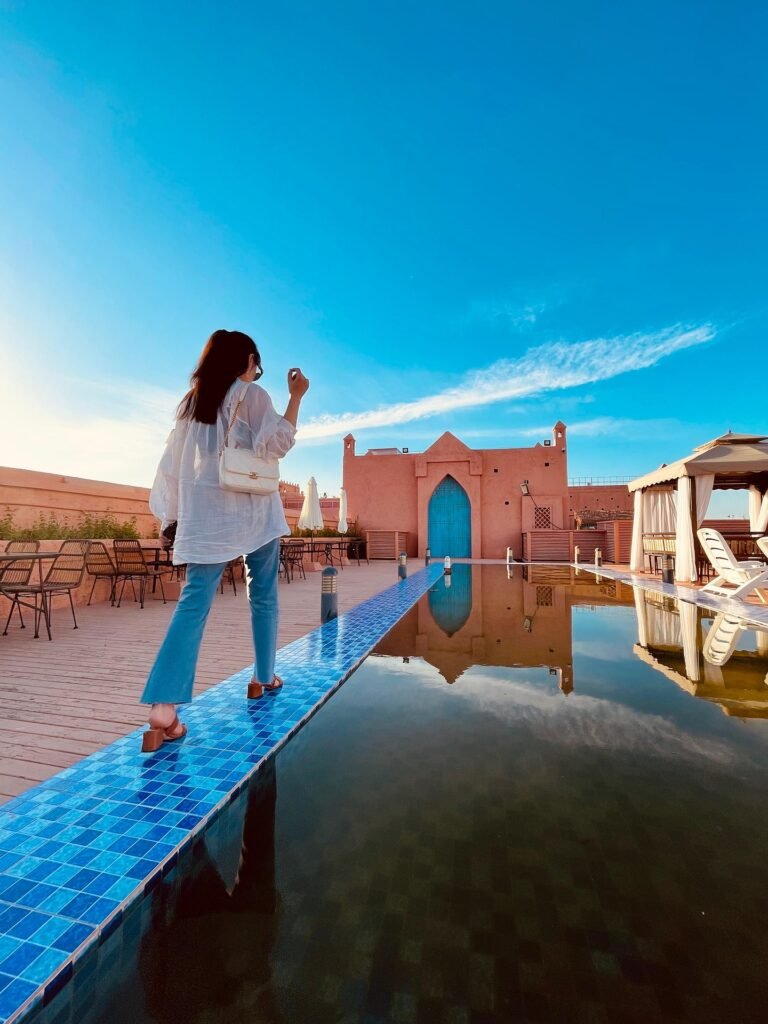
Phrase 2
Phrase 2: فين المحطة؟ (Fīn l-maḥaṭṭa?)
Translation: Where is the station?
Transliteration: Fin l-maḥaṭṭa?
If you’re planning to travel between cities in Morocco—or even just around a big city—you’ll eventually need to ask this question. “Fin l-maḥaṭṭa?” means “Where is the station?” and it can refer to a bus station, train station, or even a grand taxi stand, depending on the context.
Let’s break it down:
- Fin (فين) means “where”
- L-maḥaṭṭa (المحطة) means “the station”
Say it like this:
feen l-ma-haṭ-ṭa
Make sure to pronounce the strong ṭ sound. It’s a heavy “t” that you say with your tongue flat. But don’t worry—if you pronounce it like a regular “t,” most people will still understand you.
You can also make the question more specific depending on what you’re looking for:
- Fin maḥaṭṭat l-ṭubīs? (Where’s the bus station?)
- Fin maḥaṭṭat tran? (Where’s the train station?)
- Fin maḥaṭṭat taxi? (Where’s the taxi station?)
When you ask someone on the street or in a shop, you can be more polite by adding afak (please):
Afak, fin l-maḥaṭṭa?
(Please, where is the station?)
This question is simple, but very practical. If you’re lost or unsure which way to go, just ask. Even if the person doesn’t speak English, they’ll point you in the right direction or walk you part of the way.
I recommend writing it down or memorizing it early in your trip. You’ll use it a lot, especially if you’re moving between cities like Marrakech, Fes, Tangier, or Casablanca.
Phrase 3
Phrase 3: شحال هاد؟ (Shḥāl hād?)
Translation: How much is this?
Transliteration: Shhal had?
This is one of the most important questions you need if you plan to visit any market, street stall, or local shop in Morocco. Whether you’re in a tourist-heavy city like Marrakech or a small town far from the usual paths, prices are often not written down. Sellers expect you to ask. And this is the way you do it.
Shḥāl means “how much”
Hād means “this” (pointing to an item)
Say it like this:
sh-hal had
Two short words. Keep it simple and direct.
You walk into a souk. You see something you like—a bag, a pair of slippers, a small souvenir. You point and say: Shḥāl hād? That’s it. The vendor will respond with a number, often in Darija or sometimes in French. If you don’t understand, smile and ask them to repeat, or show them your phone and ask them to write it.
This phrase is your entry point to any price conversation. It’s also your starting point for negotiation. In many markets, especially traditional ones, bargaining is expected. But you can’t begin if you don’t know the price. This short question gets you there.
You can also change the word hād depending on the item:
- Shḥāl hād š-šanta? (How much is this bag?)
- Shḥāl hād l-qahwa? (How much is this coffee?)
If you want to be more polite, say:
Afak, shḥāl hād?
(Please, how much is this?)
Don’t rely on pointing alone. Say the words. Even if your pronunciation isn’t perfect, the effort matters. Vendors appreciate it when you speak their language, even just a few words.
Phrase 4
Phrase 4: بغيت نمشي ل… (Bghīt nimshī l…)
Translation: I want to go to…
Transliteration: Bghit nimshi l…
This phrase will help you every time you need transportation—whether you’re in a taxi, asking for directions, or buying a ticket. It’s one of the most direct and useful ways to tell someone where you want to go.
Let’s break it down:
- Bghit means “I want”
- Nimshi means “to go”
- L… is “to [a place]”
So, for example:
- Bghit nimshi l-lmdina — I want to go to the old city
- Bghit nimshi l-maḥaṭṭa — I want to go to the station
- Bghit nimshi l-masjid — I want to go to the mosque
- Bghit nimshi l-hotel — I want to go to the hotel
Say it like this:
b-ghit nim-shee l…
Use clear sounds. Don’t worry about speed. Locals will understand even if you speak slowly.
This phrase works well in a petit taxi when you’re moving inside a city. You get in, greet the driver with salam, and say:
Bghit nimshi l–[your destination]
You can also use it when asking for help:
Afak, bghit nimshi l-jamaa l-fna
(Please, I want to go to Jamaa El Fna)
It’s flexible. You can use it in rural areas, with bus drivers, or even when buying tickets at a train station. People may ask you follow-up questions, like “wahdkom?” (just you?) or “daba?” (now?), but don’t panic. Just repeat what you need calmly.
Use this phrase confidently. It shows that you know where you’re going and that you’re making an effort to speak their language.
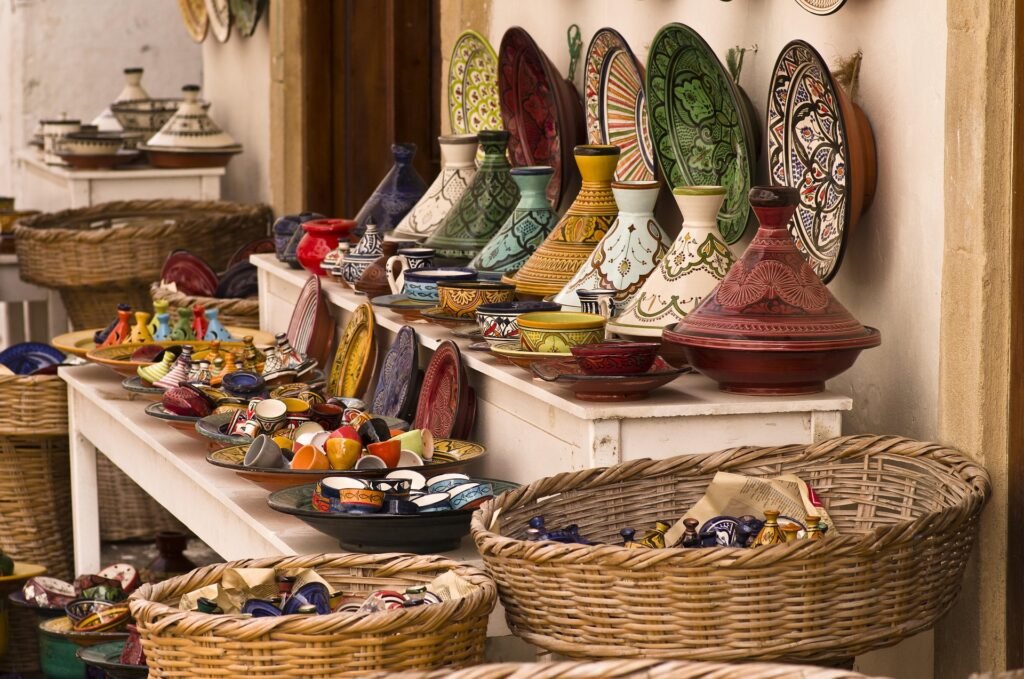
Phrase 5
Phrase 5: شنو كتدير؟ (Shno katdīr?)
Translation: What are you doing?
Transliteration: Shno katdir?
This phrase is useful in casual conversations and can help you connect with people on a more personal level. When you meet someone new or chat with locals, asking “Shno katdir?” shows interest in their daily life.
Let’s look at the words:
- Shno means “what”
- Katdir means “you do” (present tense, for “you” masculine)
So it literally means “What are you doing?”
Say it like this:
sh-no kat-deer
You can also use it with women by saying:
Shno katdīrī?
People often answer with simple things like:
- Kanqra (I’m studying)
- Kankhdem (I’m working)
- Kanmshi (I’m going)
It’s a good way to practice listening and build rapport. Locals like when foreigners show curiosity about their lives. This can open doors to longer conversations and better understanding of culture.
You can use this phrase in markets, cafes, or even with your Arabic teacher. It’s informal, friendly, and part of daily speech.
Try using it when you want to start a light conversation. It’s simple but effective.
Phrase 6
Phrase 6: فين نقدر نلقى…؟ (Fīn nqdar nalqa…?)
Translation: Where can I find…?
Transliteration: Fin nqdar nalqa…?
This phrase is essential when you want to ask for directions to find something specific. Whether it’s a pharmacy, a bank, or a market, this question will help you get what you need quickly.
Breaking it down:
- Fīn means “where”
- Nqdar means “can I” or “am I able to”
- Nalqa means “find”
Say it clearly:
feen en-qdar nal-ka?
You just add the place or item you’re looking for after the question. For example:
- Fīn nqdar nalqa l-ṣaydaliyya? (Where can I find the pharmacy?)
- Fīn nqdar nalqa l-bank? (Where can I find the bank?)
- Fīn nqdar nalqa suq? (Where can I find the market?)
Add afak at the start to be polite:
Afak, fīn nqdar nalqa…?
Moroccans like to help, especially when you ask politely. This phrase is better than just pointing or guessing. It shows you respect the language and culture.
Use this phrase anytime you need guidance. It’s practical and gets results.
Phrase 7
Phrase 7: بكم هاد؟ (Bkam hād?)
Translation: How much is this?
Transliteration: Bkam had?
This phrase is very useful for shopping and bargaining in Morocco. You use it to ask the price of an item. Unlike “Shḥāl hād?” (which means the same), “Bkam hād?” is often used interchangeably and is very common in markets.
Here’s the breakdown:
- Bkam means “with how much” or simply “how much”
- Hād means “this”
Say it like this:
b-kam had
You point at the item and ask:
Bkam hād?
Vendors expect you to ask. Prices often are not fixed, so this question starts the negotiation. You can also add afak for politeness:
Afak, bkam hād?
Remember, bargaining is part of Moroccan culture. Start with this question, then offer your price. Smile and keep the conversation friendly.
This phrase is essential for anyone who wants to shop confidently and avoid overpaying.
Phrase 8
Phrase 8: واش كتهدر الإنجليزية؟ (Wash kat-hdar l-inglīziyya?)
Translation: Do you speak English?
Transliteration: Wash kat-hdar l-ingliziya?
This phrase helps you communicate when Arabic gets difficult. Many Moroccans speak some English, especially in tourist areas, but not everyone. Asking politely if someone speaks English can save you time and avoid confusion.
Breakdown:
- Wash means “do” (used for yes/no questions)
- Kat-hdar means “you speak” (informal, masculine)
- l-inglīziyya means “English”
Say it like this:
wash kat-hdar l-ing-lee-zee-ya
For women, you can say:
Wash kat-hdari l-inglīziyya?
Use it politely by adding afak (please):
Afak, wash kat-hdar l-inglīziyya?
This question is practical in shops, hotels, or transport. It helps you know when to switch languages or find someone who can help translate.
Knowing this phrase makes your trip easier. It shows you’re trying, and people appreciate the effort.
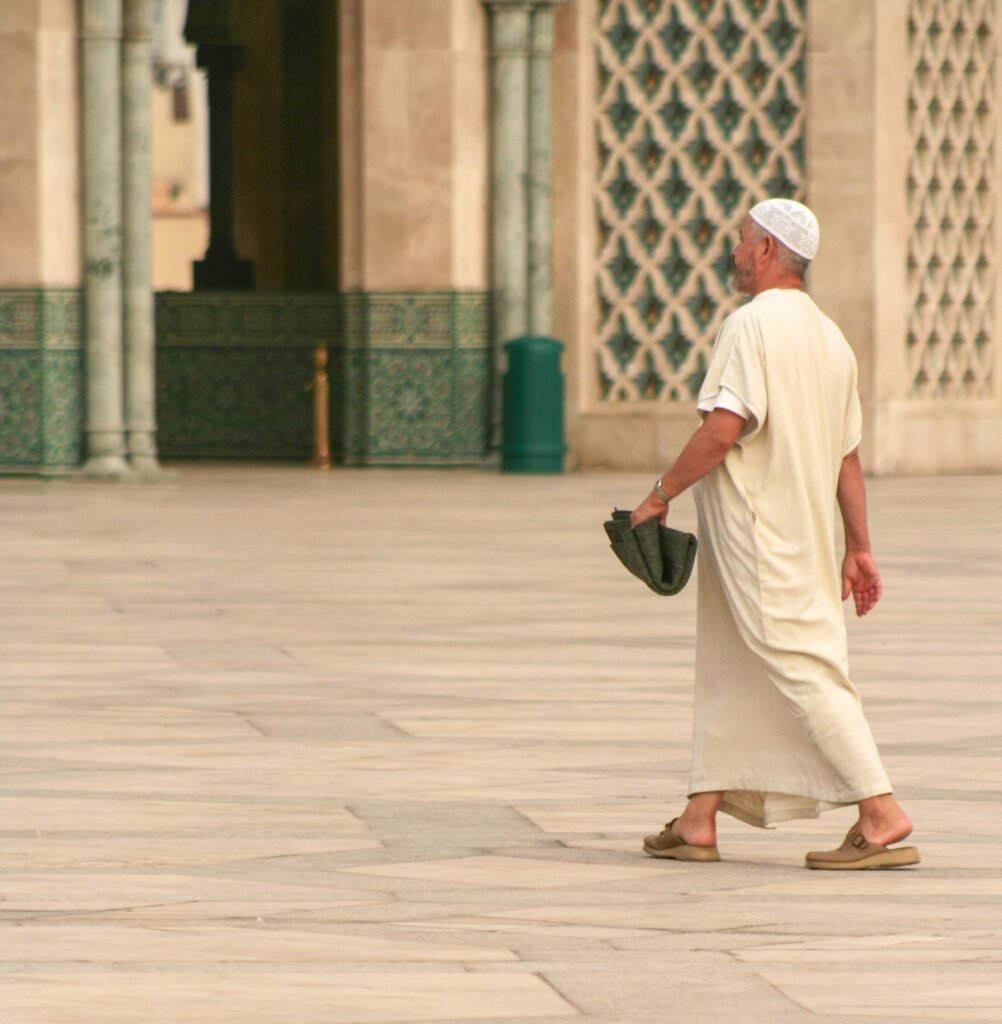
Phrase 9
Phrase 9: بغيت نطلب المساعدة (Bghīt nṭlub l-musaʿada)
Translation: I want to ask for help
Transliteration: Bghit ntlob l-musa‘ada
This phrase is essential whenever you need assistance. Whether you’re lost, feeling unwell, or need someone to explain something, saying “Bghīt nṭlub l-musaʿada” lets people know you need help.
Breakdown:
- Bghīt means “I want”
- Nṭlub means “to ask/request”
- L-musaʿada means “help”
Pronounce it like this:
b-ghit n-tlob l-moo-sa-a-da
You can use it in many situations—on the street, in shops, or even when speaking with taxi drivers. For example, if you don’t understand directions or need medical help, this phrase opens the conversation.
Adding afak (please) makes it polite:
Afak, bghīt nṭlub l-musaʿada
People in Morocco are generally helpful, especially when you speak their language politely. This phrase is a key tool to ensure your safety and comfort while traveling.
Use it confidently whenever needed. It’s better to ask than struggle alone.
Phrase 10
Phrase 10: الله يبارك فيك (Allah ybārak fīk)
Translation: God bless you / Thank you
Transliteration: Allah ybarak fik
This phrase is a polite way to say thank you and show gratitude in Morocco. It literally means “God bless you,” but Moroccans use it often to express thanks, appreciation, or to acknowledge kindness.
Breakdown:
- Allah means “God”
- Ybārak means “bless”
- Fīk means “in you”
Say it like this:
al-lah ya-bar-ak feek
You hear it in many situations: when someone helps you, gives you directions, or offers a gift. It’s a warmer, more heartfelt alternative to just saying “thank you” (shukran).
You can also respond with it if someone thanks you, to show respect and good manners.
Using this phrase shows respect for local culture and religion. It helps build friendly relationships and leaves a good impression.
Try to use it sincerely after someone assists you or gives you something. It makes a difference.
Ramdani Arabic Academy is dedicated to teaching Arabic with clear focus on practical skills. The academy’s courses are designed to help learners master reading and writing, especially for non-native speakers.
Mohamed Ramdani, the instructor, brings years of experience in teaching Arabic online. With a background in Islamic studies and several diplomas in pedagogy, he combines deep knowledge with effective teaching methods.
His approach is simple and direct, helping students build confidence through real-life language use. Whether you want to improve conversation or writing skills, Ramdani Arabic Academy offers structured courses tailored to your needs.
For more details about the academy and Mohamed Ramdani, please visit the provided links to explore the full range of courses available.
This concludes the 10 essential phrases for visitors to Morocco. Each phrase is chosen to make your trip smoother and your interactions richer.
